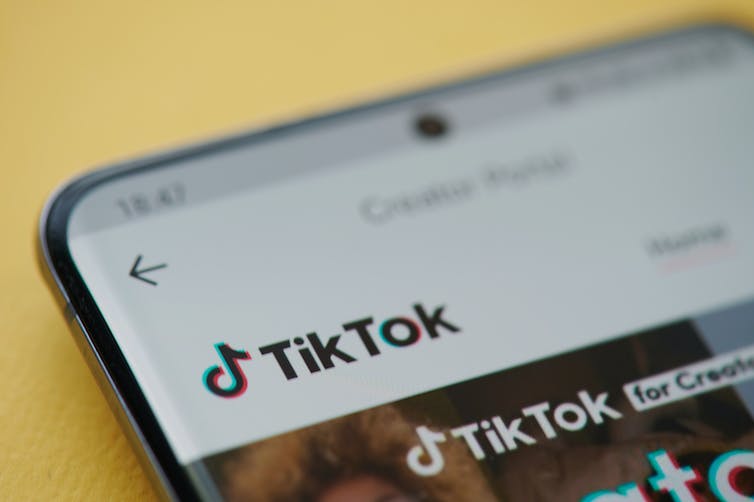
The United States government is considering a national ban of TikTok, a social media application used by over 150 million Americans. Although the primary reason for the ban is privacy concerns, it presents an opportunity to consider other potential risks.
It is well known social media apps can negatively impact mental health outcomes, a fact even acknowledged by Facebook’s leaked internal research. The impact social media use may have on our cognitive abilities, however, is less well known.
As an attention researcher, I study all the different processes our brains use to focus and maintain attention. Attention isn’t a single mechanism, but rather the result of a number of different mechanisms across various areas of the brain.
One of these mechanisms is executive functioning, defined as our ability to focus on the task at hand and filter distractions. However, not all tasks are created equal: it’s easier to focus when the object of our attention is engaging and entertaining.
Table of Contents
Designed with attention in mind
In order to keep you entertained, social media companies are constantly tracking the content you engage with. This not only means the content you “like,” but also how long you spend on each piece of content. By doing this, the app methodically presents you with related content, to keep you on its platform as long as possible.

(Shutterstock)
The way social media apps present content is crucial, as many apps now use an endless scroll feature in which users simply swipe upwards to view the next piece of content. Having a continuous stream of content is meant to absorb users into what researchers refer to as a “flow state.”
We experience flow states when we are so deeply engaged in an activity that we lose our sense of time. Flow states can be highly advantageous in a work setting, as they help us stay focused and increase efficiency in completing relevant tasks. However, social media apps try to elicit flow states to make it more difficult to leave their platform.
To put it briefly, companies are constantly tracking our attention and leveraging this data to keep us hooked.
With a majority of social media users logging in at least once a day, and one-third of teenagers using these apps “almost constantly,” it raises the question of whether social media is hurting our attention abilities.
The cost of task-switching
Throughout the day, many individuals multitask by alternating between work-related activities and using social media platforms. According to a study conducted on middle and high school students, teenagers spend, on average, less than six minutes on a task before switching to social media or texting.
While some forms of multitasking are harmless, like walking and chewing gum at the same time, it is not possible to effectively multitask on activities that share cognitive mechanisms. Instead, we engage in “task-switching,” which involves alternating between two related activities.

(Shutterstock)
Think of trying to read while simultaneously engaging in conversation: it’s not possible without disengaging from one of these activities, since they both involve language processing. Social media and most forms of work fall into this category.
One of the problems with task switching lies in “switch costs,” a term used to describe the negative effect that re-engaging with a task has on your cognition. This means every time you open social media while studying for school or working at your job, you will be slower and more error prone for a period of time when getting back to work.
Not surprisingly, people who typically engage with multiple forms of media at once show general decreases in sustained attention, or the ability to maintain focus. It is much better to block off time for work: 20 continuous minutes of work is significantly better than four five-minute blocks separated by brief social media breaks.
What about executive functioning?
There is limited research measuring the impact of social media use on the various aspects of executive functioning, but researchers do know a bit about how social media addiction may impact cognition.
Social media addiction was determined based on a developed questionnaire which asks questions on how social media impacts mood, whether the person experiences withdrawal, and whether it negatively impacts different areas of their life. If the person scores high enough on this scale, they are considered to meet the criteria for social media addiction.
Those who meet that criteria tend to be more impulsive than non-addicted social media users, as measured by a risk-assessment task, in which those addicted to social media tend to make more risky choices associated with long-term losses.
People in the study were also more impulsive after being exposed to social media during the testing session, compared to when they were tested without exposure. However, overall, individuals with social media addiction functioned normally on many of the other cognitive assessment tasks, so it appears impulsivity is the main component of cognition being impacted with problematic social media users.
It’s not all bad news, though: there are possible cognitive benefits associated with social media use for some people. Researchers found social media use in middle-aged and older adults can help improve executive functioning because of the increased access to social connection it provides. This offers a support channel to individuals who are at risk for cognitive decline due to social isolation or loneliness.
Internet trends as a measure of attention

(Shutterstock)
Until there is more research on social media use and its effects on attention, we can look at alternate sources of data to make some early predictions.
One group of scientists looked at how long hashtags spend on the top 50 charts as a measure of attention span. Researchers found that in 2013, a hashtag stayed in the top 50 for an average of 17.5 hours. This number gradually decreased to 11.9 hours by 2016. This may reflect how our capacity to engage our attention shrinks as more content becomes available.
More recently, there has been a trend on TikTok of using split-screening to display multiple videos at once. This is a new development that reflects the desire to multitask media, where a viewer can shift their eyes to another stream of content as soon as any level of boredom arises. While further research is needed to determine potential cognitive costs associated with this new style of media, the trend suggests a growing preference for content that demands less attentional effort.
![]()
Colin McCormick receives funding from an NSERC CGS-D award.























